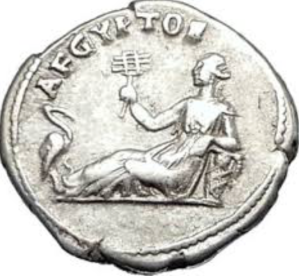
Saturninus oriundo fuit Gallus, ex gente hominum inquietissima et avida semper vel faciendi principis vel imperii. huic inter ceteros duces, quod vere summus vir esse certe videretur, Aurelianus limitis orientalis ducatum dedit, sapienter praecipiens ne umquam Aegyptum videret. cogitabat enim, quantum videmus, vir prudentissimus Gallorum naturam et verebatur ne, si perturbidam civitatem vidisset, quo eum natura ducebat, eo societate quoque hominum duceretur. sunt enim Aegyptii, ut satis nosti, viri ventosi, furibundi, iactantes, iniuriosi, atque adeo vani, liberi, novarum rerum usque ad cantilenas publicas cupientes, versificatores, epigrammatarii, mathematici, haruspices, medici. nam in eis Christiani, Samaritae, et quibus praesentia semper tempora cum enormi libertate displiceant. ac ne quis mihi Aegyptiorum irascatur et meum esse credat quod in litteras rettuli, Hadriani epistulam ponam ex libris Phlegontis liberti eius proditam, ex qua penitus Aegyptiorum vita detegitur: “Hadrianus Augustus Serviano consuli salutem. Aegyptum, quam mihi laudabas, Serviane carissime, totam didici levem, pendulam et ad omnia famae momenta volitantem. illic qui Serapem colunt Christiani sunt, et devoti sunt Serapi qui se Christi episcopos dicunt. nemo illic archisynagogus Iudaeorum, nemo Samarites, nemo Christianorum presbyter non mathematicus, non haruspex, non aliptes. ipse ille patriarcha cum Aegyptum venerit, ab aliis Serapidem adorare, ab aliis cogitur Christum. genus hominum seditiosissimum, vanissimum, iniuriosissimum; civitas opulenta, dives, fecunda, in qua nemo vivat otiosus. alii vitrum conflant, aliis charta conficitur, omnes certe linyphiones aut cuiuscumque artis esse videntur; et habent podagrosi quod agant, habent praecisi quod agant, habent caeci quod faciant, ne chiragrici quidem apud eos otiosi vivunt. unus illis deus nummus est. hunc Christiani, hunc Iudaei, hunc omnes venerantur et gentes. et utinam melius esset morata civitas, digna profecto quae pro sui fecunditate, quae pro sui magnitudine totius Aegypti teneat principatum. huic ego cuncta concessi, vetera privilegia reddidi, nova sic addidi ut praesenti gratias agerent. denique ut primum inde discessi, et in filium meum Verum multa dixerunt, et de Antinoo quae dixerint comperisse te credo. nihil illis opto, nisi ut suis pullis alantur, quos quemadmodum fecundant, pudet dicere. calices tibi allassontes versicolores transmisi, quos mihi sacerdos templi obtulit, tibi et sorori meae specialiter dedicatos; quos tu velim festis diebus conviviis adhibeas. caveas tamen ne his Africanus noster indulgenter utatur.”
(Historia Augusta, Vitae Firmi, Saturnini, Proculi et Bonosi 7-8)
Saturninus was a Gaul by birth, one of a nation that is ever most restless and always desirous of creating either an emperor or an empire. To this man, above all the other generals, because it seemed certain that he was truly the greatest, Aurelian had given the command of the Eastern frontier, wisely charging him never to visit Egypt. For, as we see, this far-sighted man was well acquainted with the Gallic character and feared that if Saturninus visited this turbulent land he might be drawn by association with the inhabitants to a course toward which he was by nature inclined. For the Egyptians, as you know well enough, are puffed up, madmen, boastful, doers of injury, and, in fact, liars and without restraint, always craving something new, even in their popular songs, writers of verse, makers of epigrams, astrologers, soothsayers, quacksalvers. Among them, indeed, are Christians and Samaritans and those who are always ill-pleased by the present, though enjoying unbounded liberty. But, lest any Egyptian be angry with me, thinking that what I have set forth in writing is solely my own, I will cite one of Hadrian’s letters, taken from the works of his freedman Phlegon, which fully reveals the character of the Egyptians.
“From Hadrian Augustus to Servianus the consul, greeting. The land of Egypt, the praises of which you have been recounting to me, my dear Servianus, I have found to be wholly light-minded, unstable, and blown about by every breath of rumour. There those who worship Serapis are, in fact, Christians, and those who call themselves bishops of Christ are, in fact, devotees of Serapis. There is no chief of the Jewish synagogue, no Samaritan, no Christian presbyter, who is not an astrologer, a soothsayer, or an anointer. Even the Patriarch himself, when he comes to Egypt, is forced by some to worship Serapis, by others to worship Christ. They are a folk most seditious, most deceitful, most given to injury; but their city is prosperous, rich, and fruitful, and in it no one is idle. Some are blowers of glass, others makers of paper, all are at least weavers of linen or seem to belong to one craft or another; the lame have their occupations, the eunuchs have theirs, the blind have theirs, and not even those whose hands are crippled are idle. Their only god is money, and this the Christians, the Jews, and, in fact, all nations adore. And would that this city had a better character, for indeed it is worthy by reason of its richness and by reason of its size to hold the chief place in the whole of Egypt. I granted it every favour, I restored to it all its ancient rights and bestowed on it new ones besides, so that the people gave thanks to me while I was present among them. Then, no sooner had I departed thence than they said many things against my son Verus, and what they said about Antinous I believe you have learned. I can only wish for them that they may live on their own chickens, which they breed in a fashion I am ashamed to describe. I am sending you over some cups, changing colour and variegated, presented to me by the priest of a temple and now dedicated particularly to you and my sister. I should like you to use them at banquets on feast-days. Take good care, however, that our dear Africanus does not use them too freely.” (tr. David Magie)
